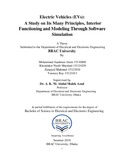| dc.contributor.advisor | Azad, A. K. M. Abdul Malek | |
| dc.contributor.author | Alam, Mohammad Saadman | |
| dc.contributor.author | Murshed, Khondaker Nazib | |
| dc.contributor.author | Mahmud, Zunayed | |
| dc.contributor.author | Roy, Tonmoy | |
| dc.date.accessioned | 2019-01-29T06:43:52Z | |
| dc.date.available | 2019-01-29T06:43:52Z | |
| dc.date.copyright | 2018 | |
| dc.date.issued | 2018 | |
| dc.identifier.other | ID 15110006 | |
| dc.identifier.other | ID 15121029 | |
| dc.identifier.other | ID 15121010 | |
| dc.identifier.other | ID 15121013 | |
| dc.identifier.uri | http://hdl.handle.net/10361/11340 | |
| dc.description | This thesis is submitted in partial fulfilment of the requirements for the degree of Bachelor of Science in Electrical and Electronic Engineering, 2018. | en_US |
| dc.description | Catalogued from PDF version of thesis. | |
| dc.description | Includes bibliographical references( pages 114-120). | |
| dc.description.abstract | Electric Vehicles (EVs) are at its most pivotal point in history in terms of popularity, development and regular consumer usage. The preferred mode of transport currently consists of conventional gasoline chambered vehicles and hybrid electric vehicles (also known as electrified vehicles), which use the gasoline vehicles in addition to batteries which supply electricity for locomotion. These batteries may be plug-in hybrid vehicles (PHEVs) or normal hybrid vehicles (HEVs). In our thesis research, we will, however, be focusing on Battery Electric Vehicles (BEVs) which eliminates the use of gasoline chambers altogether and relies solely on the power of a battery and the electricity produced by it. These BEVs can be plugged into sockets where they are charged for later use. We are now in a day and age where the fossil fuels are in rapid decline, and very soon in a matter of 33 years, in other words by the year 2051, our natural oil reserves will have depleted. In our research we have done a complete study on the different parts of an electric vehicle. A study on different types of forces acting on the vehicle while travelling on the road was done. Moreover, the different types of motors used in an Electric Vehicle was studied along with their controlling strategies. It is evident; therefore, an alternate method is required to power these vehicles, one which is more efficient as well as environmentally friendly. This transportation problem can be resolved by renovating the way automobiles functions, and it seems that electric vehicles (as opposed to electrified vehicles) are the answer. There are several advantages associated with using electrically powered cars which include zero pollution as opposed to exhaust pollution and carbon emissions from traditional vehicles, lower levels of noise pollution. This paper describes how an electric vehicle works in order to give a broad overview and insight on their functioning. It also includes the modelling of an Electric Vehicle and also the corresponding simulation results. In a comparative study in between the electric vehicle and the conventional vehicle we have put forward the importance and necessity of electric vehicle in the modern times. Therefore, this thesis paper will give a complete idea of the functioning of an electric vehicle which are supported by relevant simulation results. | en_US |
| dc.description.statementofresponsibility | Mohammad Saadman Alam | |
| dc.description.statementofresponsibility | Khondaker Nazib Murshed | |
| dc.description.statementofresponsibility | Zunayed Mahmud | |
| dc.description.statementofresponsibility | Tonmoy Roy | |
| dc.format.extent | 120 pages | |
| dc.language.iso | en | en_US |
| dc.publisher | BRAC University | en_US |
| dc.rights | BRAC University theses are protected by copyright. They may be viewed from this source for any purpose, but reproduction or distribution in any format is prohibited without written permission. | |
| dc.subject | Electric vehicles | en_US |
| dc.subject | Software simulation | en_US |
| dc.subject | Interior functioning | en_US |
| dc.subject.lcsh | Electric vehicles. | |
| dc.title | Electric vehicles (EVs): a study on its many principles, interior functioning and modeling through software simulation | en_US |
| dc.type | Thesis | en_US |
| dc.contributor.department | Department of Electrical and Electronic Engineering, BRAC University | |
| dc.description.degree | B. Electrical and Electronic Engineering | |

